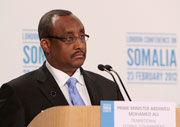 Two decades after the collapse of Somalia’s last central government, high-level representatives from forty countries met in London on February 23 to agree on an ambitious agenda for Somalia’s future. Somali government leaders, together with Secretary-General Ban Ki-moon, Secretary of State Hilary Clinton, Prime Minister David Cameron (as the host) and other European and African leaders pledged support for the United Nations plan. The UN has put forth a roadmap for replacing the Transitional Federal Government (TFG) this August with a Caretaker Authority while a broadly-based Constituent Assembly would meet later in the year to agree on a new constitution to be endorsed by the Somali people.
Two decades after the collapse of Somalia’s last central government, high-level representatives from forty countries met in London on February 23 to agree on an ambitious agenda for Somalia’s future. Somali government leaders, together with Secretary-General Ban Ki-moon, Secretary of State Hilary Clinton, Prime Minister David Cameron (as the host) and other European and African leaders pledged support for the United Nations plan. The UN has put forth a roadmap for replacing the Transitional Federal Government (TFG) this August with a Caretaker Authority while a broadly-based Constituent Assembly would meet later in the year to agree on a new constitution to be endorsed by the Somali people.
This latest international effort reflects concern not only for the protracted impasse in establishing a viable and broadly acceptable central government but the reality that Somalia has become a focal point for international terrorism on land and piracy at sea in the Gulf of Aden and the Indian Ocean. Al-Shabaab’s efforts to dominate and destabilize Mogadishu and southern Somalia are at the heart of the humanitarian crisis which has spread to Kenya over the last year, and is already overwhelmed by a massive semi-permanent Somali refugee population.
The underlying hope at the conference is that a more viable, broadly-acceptable government can finally begin to address the enormous economic development challenges facing the Somali people, as well as provide a domestic framework for addressing the root causes of Somalia’s two decades of state collapse. The point man behind the roadmap is UN Special Representative Augustine Mahiga (Tanzania). Ambassador Mahiga believes he has broad support from key regional leaders for implementing the roadmap based on the principles adopted at a meeting in Garowe recently, but little is known publicly of the positions of the different Somali factions.
International observers have expressed familiar concerns at prospects for this latest effort. Key concerns pertain to the speed of an accelerated transition; the selection process for the Constituent Assembly; the difficulty of overcoming endemic corruption within the TFG; and the limited capacity of African Union forces to deal with al-Shabaab across a broad swath of southern Somalia. As noted Somali expert Ken Menkhaus has written: “Somalia has a long history of rushed reconciliation and power sharing arrangements, and the results have generally not been good.” (Enough February 23,2012.)
The London Conference, therefore, is a new opportunity for Somalia; it was the most intense public interaction of the international community with Somalia for two decades. To succeed, however, the process of establishing a Constituent Assembly will require genuine transparency and inclusiveness to be persuasive to the Somali people. The big unknown, therefore, is how committed Somali leaders are to carrying forward this massive undertaking in an open and credible manner, and how much can be achieved in a very short timeframe. It is important to underscore that only the Somalis can provide the requisite political solution for their future–no outsider can do so. Even if a new Constituent Assembly comes into being later this year, stabilization and reconstruction of this devastated land is going to be a multi-decade proposition.
Ambassador John Hirsch, Senior Adviser at IPI, has served as United States Ambassador to the Republic of Sierra Leone, and had many other assignments in Africa, including Somalia.
About the photo: Transitional Federal Government (TFG) Prime Minister Dr Abdiweli Mohamed Ali at the London Conference on February 23, 2012. Photo credit: UK Foreign and Commonwealth Office




